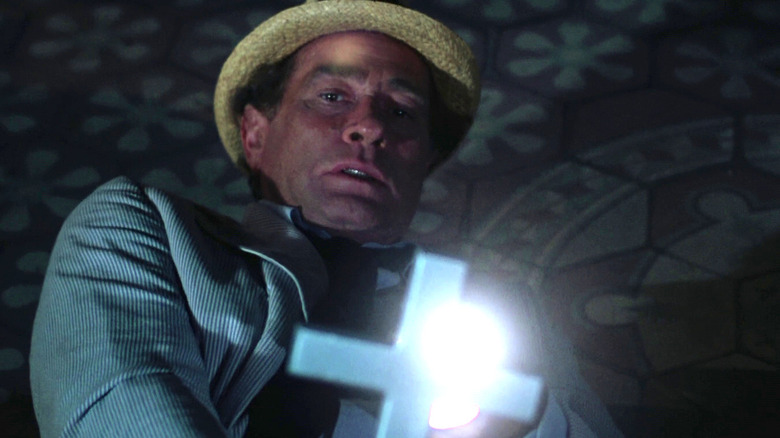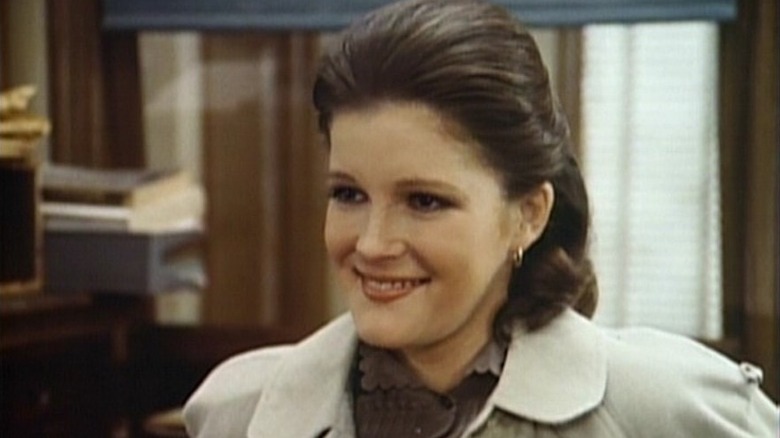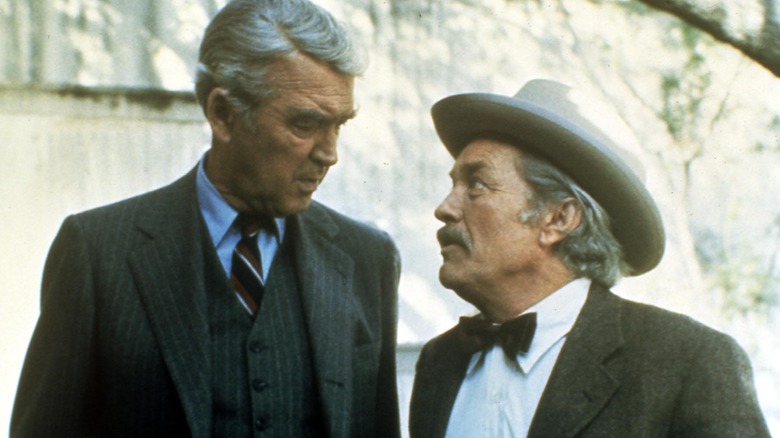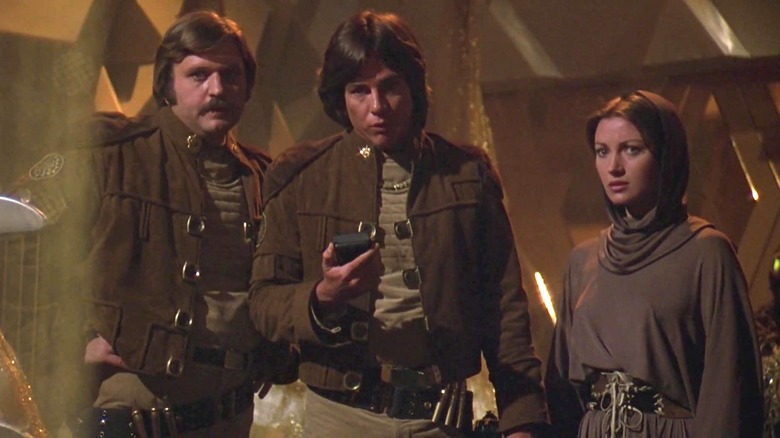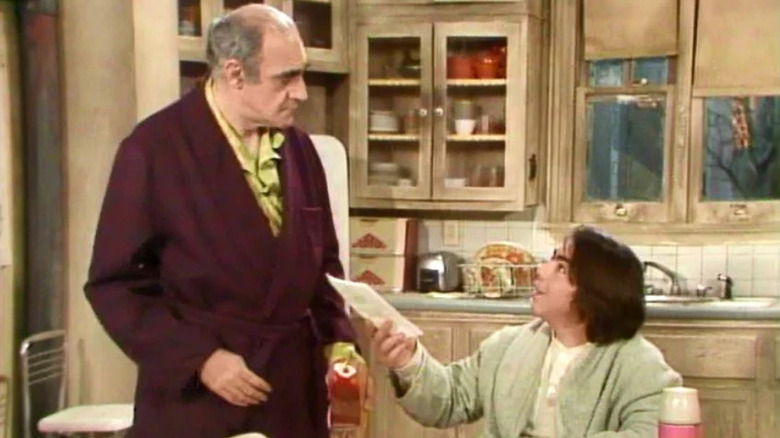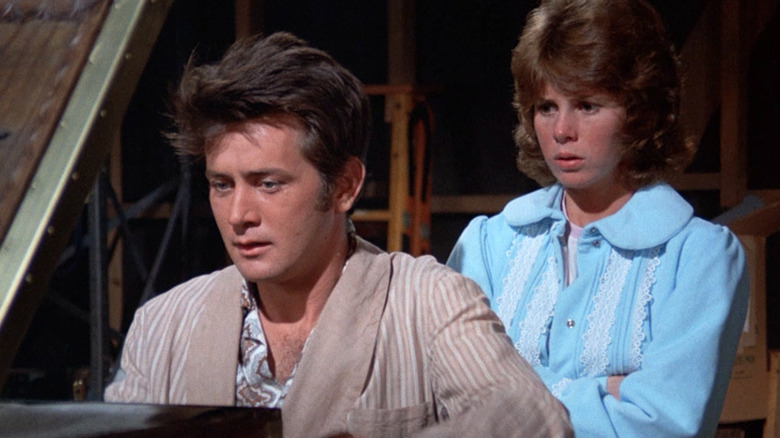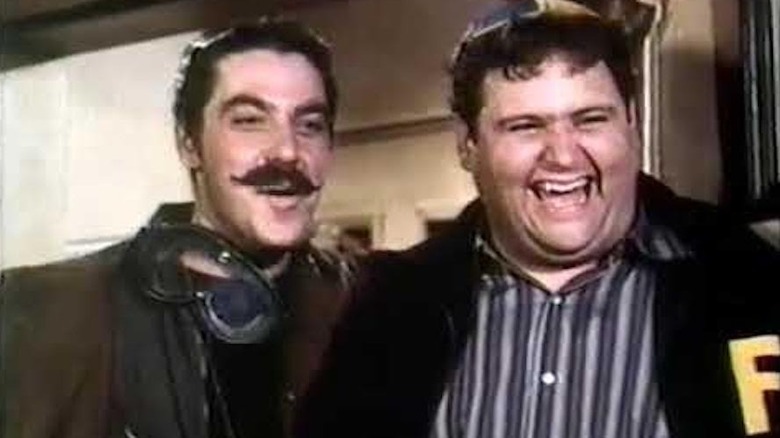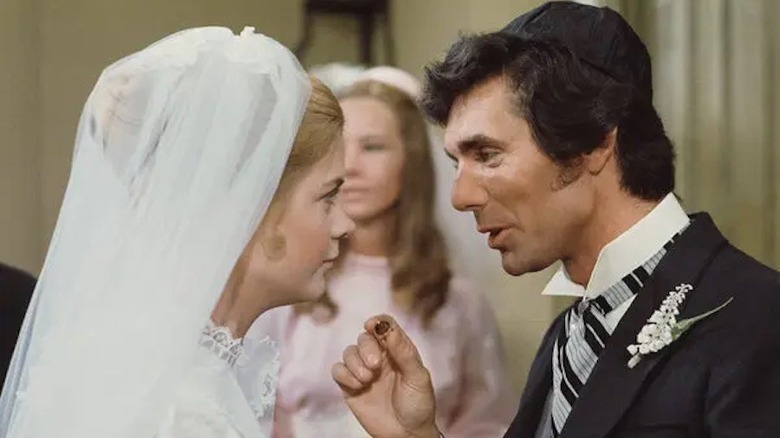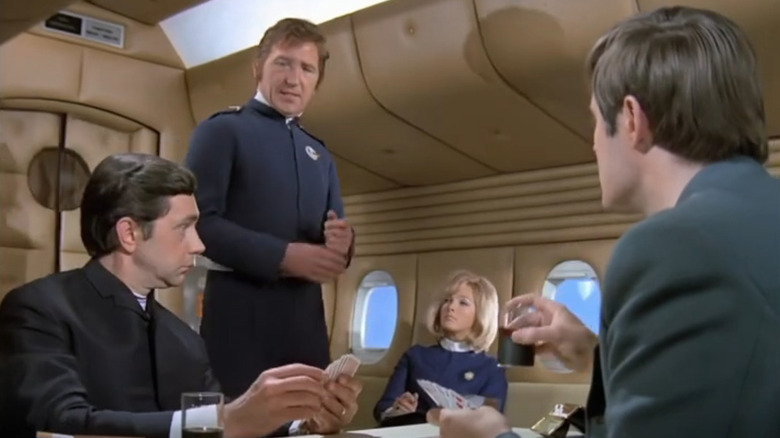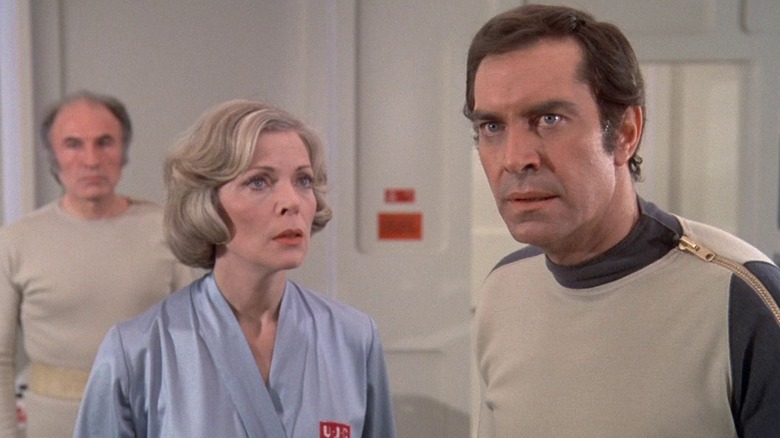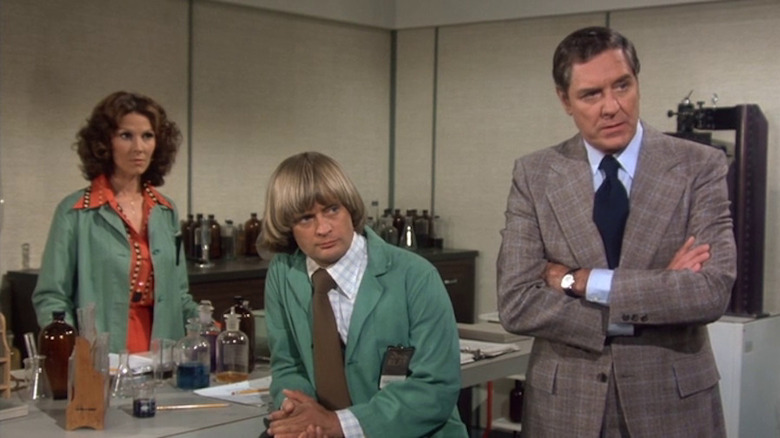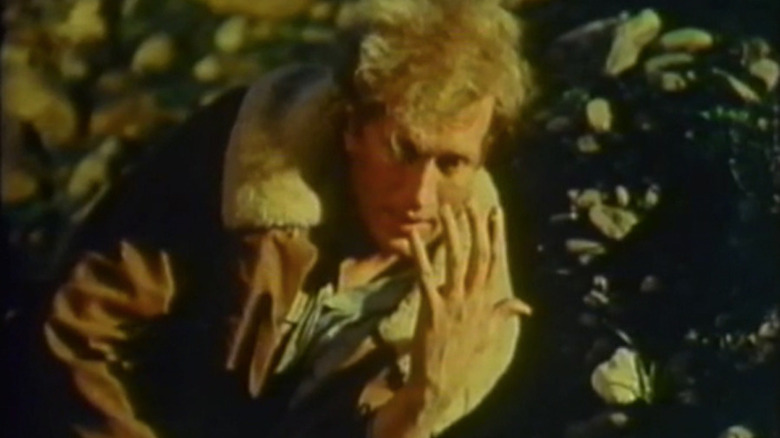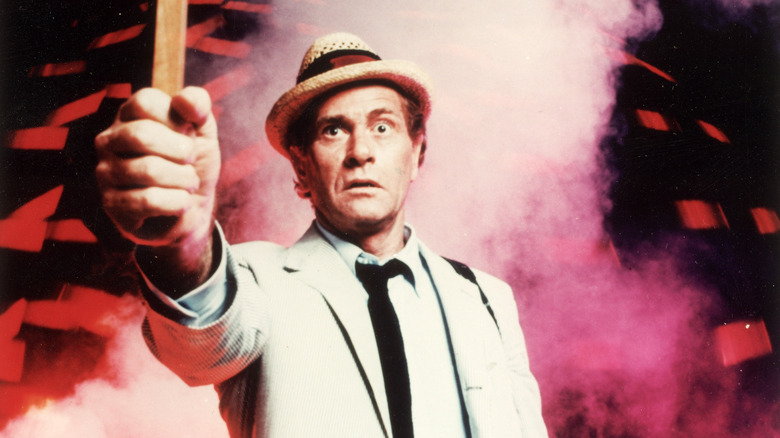'70s TV Flops That Are Actually Worth Watching
The 1970s was a decade of change in television. More wholesome programming like "My Three Sons" and "The Beverly Hillbillies" were being supplanted by edgier successors like "All in the Family" and "Good Times." Cop shows got grittier, legal procedurals more intense, and romantic dramas more titillating. While still tame by today's standards, the television of the time was being changed by shifting cultural attitudes, and some just weren't quite ready for it. But while the biggest hits of the '70s were also some of its most groundbreaking and boundary-pushing shows, there were plenty of other failed shows that came and went that were just as good.
While "The Mary Tyler Moore Show," "The Brady Bunch," and "Columbo" dominated TV networks, the '70s also gave birth to a number of great shows that didn't catch on at the time but have since become cult classics. Others have been long forgotten but are better than their reputations suggest. Some of these short-lived shows were dropped due to low ratings, others because of pay or cultural backlash. So whether you've heard of these series or not, we're highlighting some of the best TV shows from the 1970s that never found long-lived success while on the air.
Mrs. Columbo
The 1970s was the era of the spin-off, with networks eager to find a new hit from an old favorite, from "Maude" to "The Jeffersons" and countless others. One of the less successful, though, was "Mrs. Columbo," an extension of the wildly popular detective series "Columbo" starring Peter Falk. That series would often mention Columbo's wife, but she was never seen, and so in came a young up-and-comer — and future Captain Janeway actress — named Kate Mulgrew to play the title role.
Airing a year after "Columbo" ended, in 1979, "Mrs. Columbo" sees intrepid news reporter Kate Columbo following in her husband's footsteps. She isn't a detective officially, but she's a whip-smart, super-savvy amateur sleuth, and with cunning, guile, and brilliant smile, she can solve all sorts of crimes. But without Peter Falk, it seems audiences simply weren't interested, and it never managed to be anything close to the decade-long hit that "Columbo" had been. To its credit, the network did give it a second shot despite dismal ratings in its first year, retitling and retooling the show as "Kate the Detective" in its second and final season in 1980.
While it's true that "Mrs. Columbo" can't touch the quality of its parent series, there's still lots to love about it. Most notably, the presence of Mulgrew, who in her first leading role shows signs of the Emmy-nominated actor she later became, even if audiences couldn't quite appreciate it at the time.
Hawkins
Running just eight episodes, "Hawkins" was less of a weekly procedural as it was a series of sometimes-monthly mini-movies. But it did star one of the biggest names of yesteryear in the latter days of his career, as Jimmy Stewart — best remembered for movie classics like "It's a Wonderful Life" and "Rear Window" — took on the title role of lawyer Billy Jim Hawkins.
"Hawkins" isn't your typical hard-nosed legal drama, though, largely thanks to Stewart. With the movie star's endless charisma, Billy Jim Hawkins is a country bumpkin type who hides his craftiness and guile under a thick layer of simple "aw shucks" old-fashioned Southern charm. The first installment, "Death and the Maiden," debuted in the spring of 1973, and later that fall it was generally twice a month that Hawkins would head back to court on some of the most grisly cases in prime time.
Over the course of the eight stories, which typically ran about 75 minutes, Stewart was joined by a number of prominent guest stars like Cameron Mitchell and Tyne Daly, as well as future star Sam Elliott. The series' biggest flaw is the rather straightforward nature of the stories, but it's elevated by its impressive cast. While ratings were never stellar and it ended after less than a year, "Hawkins" was essentially the blueprint for "Matlock," one of the biggest hits of the following decade. So whether you're a fan of legal dramas, Stewart, or just TV history in general, "Hawkins" is a must-watch.
Battlestar Galactica
It may be best known today for the 2003 series that became a major hit on the Sci-Fi Channel, but "Battlestar Galactica" got its start in 1978. Created by Glen A. Larson (the producer also responsible for "Magnum, P.I." and "Knight Rider"), the series originally starred "Bonanza" alum Lorne Greene alongside Richard Hatch and Dirk Benedict, the future star of "The A-Team."
Set in the far reaches of space, the series opens with the destruction of the 12 Colonies of Kobol by a race of evil robots called Cylons. Led by the noble Commander Adama (Greene) and hotshot pilots Apollo (Hatch) and Starbuck (Benedict), the Battlestar Galactica takes command of the surviving civilian fleet. Now, the Cylons — joined by human traitor Baltar (John Colicos) — are hot on their tail as they set out on a mission to find the long-lost 13th colony: Earth.
Despite its high-profile star and the mega-producer behind it, "Battlestar Galactica" failed to catch on. It did manage a second season of sorts, as the show was reformatted as "Galactica 1980" that aired and was set on Earth in the titular year as the heroes try to blend in with modern society. But the original 1978 show was some of the best science fiction of the era, a solid mix of "Star Wars" and "Star Trek," with thoughtful stories, social messages, and exciting space battles. Whether you're a fan of the rebooted series or not, the original "Battlestar Galactica" is a real treat that transcends its failure on the airwaves.
Fish
Many '70s spin-off shows were spawned from some of the most popular shows of the previous decade. But our next entry was a little bit different, a spin-off of the smash hit sitcom "Barney Miller," and it launched while its parent series was still on the air and doing well in the ratings. Titled simply "Fish," the series follows the adventures of Detective Phil Fish, played by the legendary Abe Vigoda. But this was no police drama, this was an otherwise ordinary sitcom about the home life of a New York cop and his wife, Bernice (Florence Stanley).
In the series, Fish and his wife have become foster parents to a group of children in need. Following the example of other sitcoms of the day, the series went for a diverse cast of kids, too, and the family was also joined by Charlie (Barry Gordon), a child psychologist who helps the Fish clan from getting in over their heads with five — count 'em, five — new children. It may sound like a trite premise, but it wasn't far off from "Diff'rent Strokes," another series that debuted just a year later, and that show became an all-time classic.
Unfortunately, "Fish" couldn't survive in a crowded sitcom landscape, falling far in the ratings. So when Abe Vigoda demanded a raise, it was an easy decision to cancel the series, even though it was a solid show with a strong cast capable of eliciting lots of laughs.
Ghost Story
The 1970s saw the anthology genre creep into spine-tingling horror, led by Rod Serling's "Night Gallery." But there was also another spooky anthology that decade: the criminally underrated and dreadfully short-lived "Ghost Story." More than a decade before The Cryptkeeper made his TV debut, the series had its own host character in the form of Winston Essex (eerily played by "Family Affair" star Sebastian Cabot). Essex is the proprietor of a gothic mansion called the Mansfield House, and from there he introduces stories of the supernatural.
Episodes in the show's 23 stories ran the gamut of traditional horror stories with tales of ghostly hauntings, demonic possessions, bloodthirsty vampires, and sinister individuals with otherworldly powers. The show also featured plenty of popular guest stars, with appearances from Janet Leigh, Martin Sheen, and Angie Dickinson among others. But it wasn't just the stars in front of the camera who impressed, but also the talent behind the scenes. Among its roster of writers and story creators were Robert Bloch — author of "Psycho" — "Twilight Zone" scribe Richard Matheson, sci-fi great Harlan Ellison, and "Star Trek" veteran D.C. Fontana. Hammer Horror vet Jimmy Sangster also contributed to several installments.
Struggling in the ratings in 1972, "Ghost Story" was retitled "Circle of Fear" for the second half of its run, but that wasn't enough to save it. And that's too bad because it remains among the best — and one of the most underappreciated — horror anthologies ever made.
Delta House
In 1978, the comedy magazine "National Lampoon" released its first successful movie, "Animal House," directed by John Landis and co-written by future "Ghostbusters" writer Harold Ramis. Headlining the film was "Saturday Night Live" superstar John Belushi as college cut-up "Bluto" Blutarsky, who led the wild and raucous members of a local fraternity as they caused all kinds of wild trouble, to the everlasting rage of Dean Wormer (John Vernon). After it lit up the box office on its way to becoming an all-time classic, it came to television the following year in the form of "Delta House."
Landis and Belushi weren't involved, but several other original cast members returned, including Vernon, Stephen Furst, Bruce McGill, and James Widdoes. Stepping into Belushi's protagonist position was newcomer Josh Mostel, playing his brother, "Blotto." While the series lacks the bite of the original movie thanks to being on network television, it's still a laugh riot, with stories that — while not as raunchy – see the gang involved in all kinds of antics, including an episode set during the Cuban Missile Crisis.
But what makes the series even more compelling is the fact that it's some of the first work from writer-director John Hughes, the man responsible for future favorites like "Sixteen Candles," "Ferris Bueller's Day Off" and "Home Alone." Like the movie, it's executive-produced by Ivan Reitman, while Ramis returned to pen the opening episode alongside the original film's co-writers Douglas Kenney and Chris Miller. The series also features an early appearance from a young Michelle Pfeiffer.
Bridget Loves Bernie
Before she starred in "Family Ties," actor Meredith Baxter starred opposite David Birney in "Bridget Loves Bernie," a 1972 sitcom about a Catholic woman who marries a Jewish man. The series explores the problems and joys that resulted from the coupling of two people from different faiths, creating as much thoughtful discussion as it did comic mix-ups. It may seem strange to think today, but this kind of mixed marriage was still somewhat controversial in some circles at the time, and sadly, that's precisely why the show failed.
Despite good reviews, scandal erupted when religious groups who didn't like that the show was promoting interfaith marriage caused an uproar. As detailed by The New York Times, these groups tried to get the show to ditch its entire premise, but when network executives scoffed at retooling the show, protests intensified and the show was pulled from the air entirely. Obviously, such mixed marriages are commonplace today and barely raise an eyebrow. But the backlash to "Bridget Loves Bernie" proves that complaints over TV shows and movies being "too woke" are nothing new.
The remarkable thing about the cancelation of "Bridget Loves Bernie," though, is that it's not quite a flop in the traditional sense. It got rock-solid ratings, even besting some of the biggest shows of the decade like "Gunsmoke" and "The Mary Tyler Moore Show." In fact, it was the fifth most-watched show of the season, and for good reason: It's really good.
Gerry Anderson's UFO
Gerry Anderson is best known for the British kids show "Thunderbirds," the 1960s adventure series that used puppets and models to tell the story of a group of space-age adventurers. But that was just one in a long line of shows he created, and in the 1970s, several of them made their way to the United States. Unfortunately, they rarely found success. One of the best of those stateside flops was "UFO," a series that may have been a little too far ahead of its time to find success in America.
Set in the far-off future of 1980, the series centered on a clandestine organization called SHADO (Supreme Headquarters Alien Defense Organization). Composed of members from around the globe, their task is to monitor outer space and stop an alien invasion by a race of beings who have been secretly visiting the Earth for years. For the show, Anderson eschewed the puppetry of "Thunderbirds" and went for a live-action adventure series while featuring a broad ensemble cast.
Smartly written sci-fi stories and some of the most impressive special effects you're likely ever to see out of the early 1970s helped it become a favorite of kids and adults. Over the years it's become a bonafide cult classic, and though ratings were poor, for many this British sci-fi series sits right alongside the likes of classic "Doctor Who" and the original "Star Trek."
Space: 1999
When "UFO" ended its American run in syndication, that wasn't the end of the franchise. Networks obviously liked the show even if it wasn't enough of a hit to stay on the air. While creator Gerry Anderson had originally envisioned a new series to act as a direct sequel, after "UFO" was canceled due to low ratings, that sophomore season was retooled into something entirely different: "Space: 1999."
What the series had over "UFO" was a pair of superstar cast members leading the charge: "Mission: Impossible" stars Martin Landau and Barbara Bain — who were also married at the time — headlined the series. They starred as John Koenig and Helena Russell, leaders of Moonbase Alpha, a lunar research station that's thrown into chaos when a nuclear disaster sends Earth's biggest natural satellite spinning off into space. Like "UFO," the show features high-quality special effects, while its impressive cast helps to make it something much more than your ordinary 1970s space action series.
Like "Star Trek" and its predecessor "UFO," the show wasn't a massive hit despite it being some of the best science fiction on television. To make matters worse, the series was incredibly expensive to produce, and while a second season attempted to retool the show to better appeal to American audiences, it was canned after 48 episodes.
The Invisible Man
These days, Hollywood is always trying to reinvent a classic with a modern twist. But the trend goes back further than you'd expect, with the 1970s actually seeing a few reinventions of iconic literary works, and of that lot, it's the 1975 series "The Invisible Man" that makes our list. Loosely based on the novel by H.G. Wells, the series is set in (what was then) contemporary times and revolves around the exploits of scientist Daniel Westin (David McCallum), whose latest experiments for the Klae Corporation involve teleportation. But when he inadvertently stumbles upon the secret to invisibility, he decides to test it on himself.
Before Westin can convince the company of the practical applications of his invention, he learns that Klae is actually being funded by the government — who will use his research as a devastating weapon. After destroying his own research, Westin mistakenly becomes permanently invisible and must use a series of fabricated lifelike masks to be seen. To fund the research needed to regain his visibility, Westin uses his newfound power to become an intelligence agent of sorts in service of Klae boss Walter Carlson (Craig Stevens).
Part fantasy, part science-fiction, part spy series, "The Invisible Man" takes Wells' original concept in a new direction and runs with it. While it's not quite as good as the shows it's clearly influenced by (it owes something of a debt to "Mission: Impossible"), it's a fun little series more than worth watching.
The Manhunter
Gritty crime dramas were all the rage in the 1970s, with movies like "Serpico" and "The French Connection" on the big screen and plenty of police and detective dramas on television. In 1974, though, CBS tried something a bit different with the genre, going for a period piece set amidst the turmoil of the Great Depression in the 1930s. In "The Manhunter" we meet Dave Barret (Ken Howard), a former Marine from Idaho who returns home after fighting overseas and decides to take up a new role as a bounty hunter.
A solid procedural that fits well alongside similar shows of the era, "The Manhunter" follows Barret across the countryside as he tracks down bank robbers, murderers, kidnappers, and extortionists. As action-packed as any of the decade's biggest hits, the show boasts fast-paced car chases, guns-blazing shootouts, and bare-knuckle brawls. But it's also known for hosting appearances from biggest '80s stars before they were famous, including Mark Hamill, Dabney Coleman, and Tom Skerritt.
The problem with "The Manhunter," though, wasn't that it wasn't good — it's that it wasn't among the best. In a crowded field, it failed to stand out and was cut short after just one season. But if you love 1970s crime dramas, this should be right up your bullet-riddled alley.
Kolchak: The Night Stalker
In the 1970s it wasn't as common as it is today for shows to blend disparate genres like horror and crime fiction. But in 1974, the ABC network did just that when they created the occult crime drama "Kolchak: The Night Stalker." The series centered on the exploits of mercurial and aloof investigator Carl Kolchak, whose cases all involve otherworldly elements. "Kolchak" kicked off with a pair of TV movies, "The Night Stalker" and "The Night Strangler," both of which saw Kolchak tracking down supernatural killers.
With the two films written by the legendary Richard Matheson and the character based on a novel by Jeff Rice, "Kolchak: The Night Stalker" stars TV icon Darren McGavin. Across the show's scant 20 episodes, he'd face down everything from zombies and aliens to ancient spirits and devilish cults. While the initial two stories might have done well as prime-time movies of the week, the show may have been a bit too grim for a network series. It was never a hit, plummeting to 74th in the ratings in its only season.
"Kolchak: The Night Stalker" wasn't just stellar drama — it was fresh and new, but audiences simply may not have been ready for it. Eventually, though, it would garner a passionate fan following, and "X-Files" creator Chris Carter also acknowledged that his show was heavily inspired by "Kolchak." The series received an even shorter-lived remake in 2005 starring Stuart Townsend.
